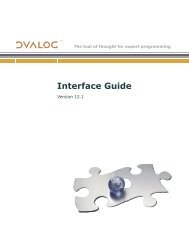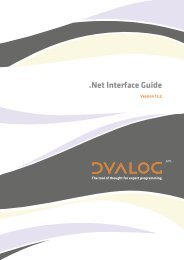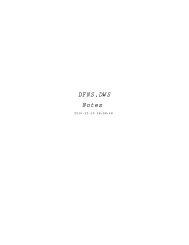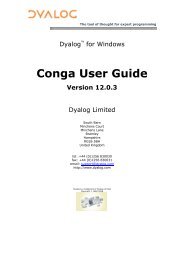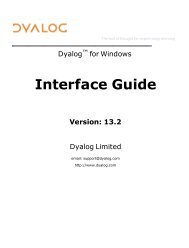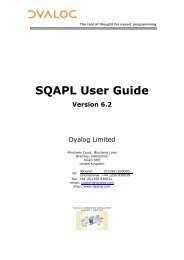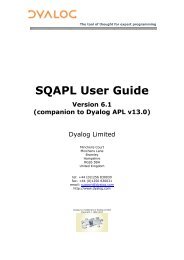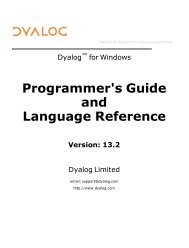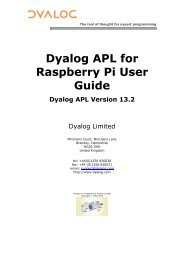- Page 1 and 2: The tool of thought for expert prog
- Page 3 and 4: 3ContentsChapter 1: Introduction 1W
- Page 5 and 6: And, Lowest Common Multiple: 223Ass
- Page 7 and 8: 7Take with Axes: 317Times: 318Trans
- Page 9 and 10: File Check and Repair: 431File Copy
- Page 11 and 12: 11Shared Variable Retract Offer: 60
- Page 13 and 14: KEY CODE TYPE ERROR 694FORMAT FILE
- Page 15 and 16: Chapter 1: Introduction 1Chapter 1:
- Page 17 and 18: Chapter 1: Introduction 3Namespaces
- Page 19 and 20: Chapter 1: Introduction 5TypeAn arr
- Page 21 and 22: Chapter 1: Introduction 7Enclosed E
- Page 23 and 24: Vector NotationChapter 1: Introduct
- Page 25 and 26: Display of ArraysChapter 1: Introdu
- Page 27 and 28: Chapter 1: Introduction 13Examples2
- Page 29 and 30: Prototypes and Fill ItemsChapter 1:
- Page 31 and 32: ExpressionsChapter 1: Introduction
- Page 33 and 34: Chapter 1: Introduction 19Defined F
- Page 35 and 36: OperatorsChapter 1: Introduction 21
- Page 37 and 38: Complex NumbersChapter 1: Introduct
- Page 39 and 40: Chapter 1: Introduction 25Circular
- Page 41: Chapter 1: Introduction 27128 Bit D
- Page 45 and 46: Chapter 1: Introduction 31The Dyalo
- Page 47 and 48: Chapter 1: Introduction 33You may a
- Page 49 and 50: Chapter 1: Introduction 35Namespace
- Page 51 and 52: Chapter 1: Introduction 37Notice th
- Page 53 and 54: Chapter 1: Introduction 39An altern
- Page 55 and 56: Chapter 1: Introduction 41Note that
- Page 57 and 58: Chapter 1: Introduction 43⍝ Struc
- Page 59 and 60: Chapter 1: Introduction 45Namespace
- Page 61 and 62: Chapter 1: Introduction 47When a pa
- Page 63 and 64: Chapter 1: Introduction 49Name Scop
- Page 65 and 66: Chapter 1: Introduction 51∇ INIT;
- Page 67 and 68: Chapter 1: Introduction 53Now, alth
- Page 69 and 70: Chapter 1: Introduction 55Synchroni
- Page 71 and 72: Chapter 1: Introduction 57Latch Exa
- Page 73 and 74: Chapter 1: Introduction 59Removing
- Page 75 and 76: Component FilesChapter 1: Introduct
- Page 77 and 78: Chapter 2: Defined Functions & Oper
- Page 79 and 80: Chapter 2: Defined Functions & Oper
- Page 81 and 82: Chapter 2: Defined Functions & Oper
- Page 83 and 84: Function Declaration StatementsChap
- Page 85 and 86: Chapter 2: Defined Functions & Oper
- Page 87 and 88: Chapter 2: Defined Functions & Oper
- Page 89 and 90: Chapter 2: Defined Functions & Oper
- Page 91 and 92: Chapter 2: Defined Functions & Oper
- Page 93 and 94:
Chapter 2: Defined Functions & Oper
- Page 95 and 96:
Chapter 2: Defined Functions & Oper
- Page 97 and 98:
Chapter 2: Defined Functions & Oper
- Page 99 and 100:
Chapter 2: Defined Functions & Oper
- Page 101 and 102:
Chapter 2: Defined Functions & Oper
- Page 103 and 104:
Chapter 2: Defined Functions & Oper
- Page 105 and 106:
Chapter 2: Defined Functions & Oper
- Page 107 and 108:
Chapter 2: Defined Functions & Oper
- Page 109 and 110:
Chapter 2: Defined Functions & Oper
- Page 111 and 112:
Chapter 2: Defined Functions & Oper
- Page 113 and 114:
TriggersChapter 2: Defined Function
- Page 115 and 116:
Chapter 2: Defined Functions & Oper
- Page 117 and 118:
Chapter 2: Defined Functions & Oper
- Page 119 and 120:
Chapter 2: Defined Functions & Oper
- Page 121 and 122:
Chapter 2: Defined Functions & Oper
- Page 123 and 124:
Chapter 2: Defined Functions & Oper
- Page 125 and 126:
Chapter 2: Defined Functions & Oper
- Page 127 and 128:
Chapter 2: Defined Functions & Oper
- Page 129 and 130:
Chapter 2: Defined Functions & Oper
- Page 131 and 132:
Chapter 2: Defined Functions & Oper
- Page 133 and 134:
Chapter 2: Defined Functions & Oper
- Page 135 and 136:
Chapter 2: Defined Functions & Oper
- Page 137 and 138:
Chapter 2: Defined Functions & Oper
- Page 139 and 140:
Chapter 2: Defined Functions & Oper
- Page 141 and 142:
Chapter 2: Defined Functions & Oper
- Page 143 and 144:
Chapter 2: Defined Functions & Oper
- Page 145 and 146:
Chapter 2: Defined Functions & Oper
- Page 147 and 148:
Chapter 2: Defined Functions & Oper
- Page 149 and 150:
Chapter 2: Defined Functions & Oper
- Page 151 and 152:
Chapter 3: Object Oriented Programi
- Page 153 and 154:
Chapter 3: Object Oriented Programi
- Page 155 and 156:
Chapter 3: Object Oriented Programi
- Page 157 and 158:
Chapter 3: Object Oriented Programi
- Page 159 and 160:
Chapter 3: Object Oriented Programi
- Page 161 and 162:
Chapter 3: Object Oriented Programi
- Page 163 and 164:
Chapter 3: Object Oriented Programi
- Page 165 and 166:
Chapter 3: Object Oriented Programi
- Page 167 and 168:
Chapter 3: Object Oriented Programi
- Page 169 and 170:
DestructorsChapter 3: Object Orient
- Page 171 and 172:
Chapter 3: Object Oriented Programi
- Page 173 and 174:
Chapter 3: Object Oriented Programi
- Page 175 and 176:
Chapter 3: Object Oriented Programi
- Page 177 and 178:
Chapter 3: Object Oriented Programi
- Page 179 and 180:
Chapter 3: Object Oriented Programi
- Page 181 and 182:
Chapter 3: Object Oriented Programi
- Page 183 and 184:
Chapter 3: Object Oriented Programi
- Page 185 and 186:
Chapter 3: Object Oriented Programi
- Page 187 and 188:
Chapter 3: Object Oriented Programi
- Page 189 and 190:
Chapter 3: Object Oriented Programi
- Page 191 and 192:
Chapter 3: Object Oriented Programi
- Page 193 and 194:
Chapter 3: Object Oriented Programi
- Page 195 and 196:
Chapter 3: Object Oriented Programi
- Page 197 and 198:
Chapter 3: Object Oriented Programi
- Page 199 and 200:
Chapter 3: Object Oriented Programi
- Page 201 and 202:
Chapter 3: Object Oriented Programi
- Page 203 and 204:
Chapter 3: Object Oriented Programi
- Page 205 and 206:
Chapter 3: Object Oriented Programi
- Page 207 and 208:
Chapter 3: Object Oriented Programi
- Page 209 and 210:
Namespace ScriptsChapter 3: Object
- Page 211 and 212:
Chapter 3: Object Oriented Programi
- Page 213 and 214:
Chapter 3: Object Oriented Programi
- Page 215 and 216:
Chapter 3: Object Oriented Programi
- Page 217 and 218:
Chapter 3: Object Oriented Programi
- Page 219 and 220:
Chapter 3: Object Oriented Programi
- Page 221 and 222:
Chapter 3: Object Oriented Programi
- Page 223 and 224:
Chapter 3: Object Oriented Programi
- Page 225 and 226:
Chapter 3: Object Oriented Programi
- Page 227 and 228:
Chapter 4: Primitive Functions 213C
- Page 229 and 230:
Chapter 4: Primitive Functions 215D
- Page 231 and 232:
Chapter 4: Primitive Functions 217T
- Page 233 and 234:
ConformabilityFill ElementsChapter
- Page 235 and 236:
Chapter 4: Primitive Functions 221A
- Page 237 and 238:
Chapter 4: Primitive Functions 223A
- Page 239 and 240:
Chapter 4: Primitive Functions 225F
- Page 241 and 242:
Chapter 4: Primitive Functions 227A
- Page 243 and 244:
Chapter 4: Primitive Functions 229C
- Page 245 and 246:
Chapter 4: Primitive Functions 231A
- Page 247 and 248:
Chapter 4: Primitive Functions 233T
- Page 249 and 250:
Chapter 4: Primitive Functions 235E
- Page 251 and 252:
Chapter 4: Primitive Functions 237C
- Page 253 and 254:
Chapter 4: Primitive Functions 239C
- Page 255 and 256:
Chapter 4: Primitive Functions 241P
- Page 257 and 258:
Chapter 4: Primitive Functions 243W
- Page 259 and 260:
Chapter 4: Primitive Functions 245D
- Page 261 and 262:
Chapter 4: Primitive Functions 247D
- Page 263 and 264:
Chapter 4: Primitive Functions 249E
- Page 265 and 266:
Chapter 4: Primitive Functions 251I
- Page 267 and 268:
Chapter 4: Primitive Functions 253E
- Page 269 and 270:
Chapter 4: Primitive Functions 255E
- Page 271 and 272:
Chapter 4: Primitive Functions 257E
- Page 273 and 274:
Chapter 4: Primitive Functions 259F
- Page 275 and 276:
Chapter 4: Primitive Functions 261E
- Page 277 and 278:
Chapter 4: Primitive Functions 263I
- Page 279 and 280:
Chapter 4: Primitive Functions 265I
- Page 281 and 282:
Chapter 4: Primitive Functions 267N
- Page 283 and 284:
Chapter 4: Primitive Functions 269E
- Page 285 and 286:
Chapter 4: Primitive Functions 271G
- Page 287 and 288:
Chapter 4: Primitive Functions 273G
- Page 289 and 290:
Chapter 4: Primitive Functions 275E
- Page 291 and 292:
Chapter 4: Primitive Functions 277I
- Page 293 and 294:
Chapter 4: Primitive Functions 279
- Page 295 and 296:
Chapter 4: Primitive Functions 281F
- Page 297 and 298:
Chapter 4: Primitive Functions 283R
- Page 299 and 300:
Chapter 4: Primitive Functions 285L
- Page 301 and 302:
Chapter 4: Primitive Functions 287L
- Page 303 and 304:
Chapter 4: Primitive Functions 289M
- Page 305 and 306:
Chapter 4: Primitive Functions 291M
- Page 307 and 308:
Chapter 4: Primitive Functions 293M
- Page 309 and 310:
Chapter 4: Primitive Functions 295N
- Page 311 and 312:
Chapter 4: Primitive Functions 2971
- Page 313 and 314:
Chapter 4: Primitive Functions 299]
- Page 315 and 316:
Chapter 4: Primitive Functions 301P
- Page 317 and 318:
Chapter 4: Primitive Functions 303R
- Page 319 and 320:
Chapter 4: Primitive Functions 305,
- Page 321 and 322:
Chapter 4: Primitive Functions 307E
- Page 323 and 324:
Chapter 4: Primitive Functions 309R
- Page 325 and 326:
Chapter 4: Primitive Functions 311i
- Page 327 and 328:
Chapter 4: Primitive Functions 313S
- Page 329 and 330:
Chapter 4: Primitive Functions 315T
- Page 331 and 332:
Chapter 4: Primitive Functions 317T
- Page 333 and 334:
Chapter 4: Primitive Functions 3192
- Page 335 and 336:
Chapter 5: Primitive Operators 321C
- Page 337 and 338:
Operators (A-Z)Chapter 5: Primitive
- Page 339 and 340:
Chapter 5: Primitive Operators 325A
- Page 341 and 342:
Chapter 5: Primitive Operators 327E
- Page 343 and 344:
Chapter 5: Primitive Operators 329C
- Page 345 and 346:
Chapter 5: Primitive Operators 331C
- Page 347 and 348:
Chapter 5: Primitive Operators 333E
- Page 349 and 350:
Chapter 5: Primitive Operators 335I
- Page 351 and 352:
Chapter 5: Primitive Operators 337P
- Page 353 and 354:
Chapter 5: Primitive Operators 339R
- Page 355 and 356:
,/''^Chapter 5: Primitive Operators
- Page 357 and 358:
Chapter 5: Primitive Operators 343S
- Page 359 and 360:
Chapter 5: Primitive Operators 345S
- Page 361 and 362:
Chapter 5: Primitive Operators 347T
- Page 363 and 364:
Chapter 5: Primitive Operators 349I
- Page 365 and 366:
Chapter 5: Primitive Operators 351C
- Page 367 and 368:
Chapter 5: Primitive Operators 353M
- Page 369 and 370:
Chapter 5: Primitive Operators 355E
- Page 371 and 372:
Chapter 5: Primitive Operators 357R
- Page 373 and 374:
Chapter 5: Primitive Operators 359H
- Page 375 and 376:
Chapter 5: Primitive Operators 361F
- Page 377 and 378:
Chapter 5: Primitive Operators 363R
- Page 379 and 380:
Chapter 5: Primitive Operators 365S
- Page 381 and 382:
Chapter 6: System Functions & Varia
- Page 383 and 384:
System VariablesChapter 6: System F
- Page 385 and 386:
System ConstantsChapter 6: System F
- Page 387 and 388:
Chapter 6: System Functions & Varia
- Page 389 and 390:
Chapter 6: System Functions & Varia
- Page 391 and 392:
Chapter 6: System Functions & Varia
- Page 393 and 394:
Chapter 6: System Functions & Varia
- Page 395 and 396:
Chapter 6: System Functions & Varia
- Page 397 and 398:
Chapter 6: System Functions & Varia
- Page 399 and 400:
Chapter 6: System Functions & Varia
- Page 401 and 402:
Chapter 6: System Functions & Varia
- Page 403 and 404:
Chapter 6: System Functions & Varia
- Page 405 and 406:
Chapter 6: System Functions & Varia
- Page 407 and 408:
Chapter 6: System Functions & Varia
- Page 409 and 410:
Chapter 6: System Functions & Varia
- Page 411 and 412:
Chapter 6: System Functions & Varia
- Page 413 and 414:
Chapter 6: System Functions & Varia
- Page 415 and 416:
Chapter 6: System Functions & Varia
- Page 417 and 418:
Chapter 6: System Functions & Varia
- Page 419 and 420:
Chapter 6: System Functions & Varia
- Page 421 and 422:
Chapter 6: System Functions & Varia
- Page 423 and 424:
Chapter 6: System Functions & Varia
- Page 425 and 426:
Chapter 6: System Functions & Varia
- Page 427 and 428:
Chapter 6: System Functions & Varia
- Page 429 and 430:
Chapter 6: System Functions & Varia
- Page 431 and 432:
Chapter 6: System Functions & Varia
- Page 433 and 434:
Chapter 6: System Functions & Varia
- Page 435 and 436:
Chapter 6: System Functions & Varia
- Page 437 and 438:
Chapter 6: System Functions & Varia
- Page 439 and 440:
Chapter 6: System Functions & Varia
- Page 441 and 442:
Chapter 6: System Functions & Varia
- Page 443 and 444:
Chapter 6: System Functions & Varia
- Page 445 and 446:
Chapter 6: System Functions & Varia
- Page 447 and 448:
Chapter 6: System Functions & Varia
- Page 449 and 450:
Chapter 6: System Functions & Varia
- Page 451 and 452:
Chapter 6: System Functions & Varia
- Page 453 and 454:
Chapter 6: System Functions & Varia
- Page 455 and 456:
Chapter 6: System Functions & Varia
- Page 457 and 458:
Chapter 6: System Functions & Varia
- Page 459 and 460:
Chapter 6: System Functions & Varia
- Page 461 and 462:
Chapter 6: System Functions & Varia
- Page 463 and 464:
Chapter 6: System Functions & Varia
- Page 465 and 466:
Chapter 6: System Functions & Varia
- Page 467 and 468:
Chapter 6: System Functions & Varia
- Page 469 and 470:
Chapter 6: System Functions & Varia
- Page 471 and 472:
Chapter 6: System Functions & Varia
- Page 473 and 474:
Chapter 6: System Functions & Varia
- Page 475 and 476:
Chapter 6: System Functions & Varia
- Page 477 and 478:
Chapter 6: System Functions & Varia
- Page 479 and 480:
Chapter 6: System Functions & Varia
- Page 481 and 482:
Chapter 6: System Functions & Varia
- Page 483 and 484:
Chapter 6: System Functions & Varia
- Page 485 and 486:
Chapter 6: System Functions & Varia
- Page 487 and 488:
Chapter 6: System Functions & Varia
- Page 489 and 490:
Chapter 6: System Functions & Varia
- Page 491 and 492:
Chapter 6: System Functions & Varia
- Page 493 and 494:
Chapter 6: System Functions & Varia
- Page 495 and 496:
Chapter 6: System Functions & Varia
- Page 497 and 498:
Chapter 6: System Functions & Varia
- Page 499 and 500:
Chapter 6: System Functions & Varia
- Page 501 and 502:
Chapter 6: System Functions & Varia
- Page 503 and 504:
Chapter 6: System Functions & Varia
- Page 505 and 506:
Chapter 6: System Functions & Varia
- Page 507 and 508:
Chapter 6: System Functions & Varia
- Page 509 and 510:
Chapter 6: System Functions & Varia
- Page 511 and 512:
Chapter 6: System Functions & Varia
- Page 513 and 514:
Chapter 6: System Functions & Varia
- Page 515 and 516:
Chapter 6: System Functions & Varia
- Page 517 and 518:
Chapter 6: System Functions & Varia
- Page 519 and 520:
Chapter 6: System Functions & Varia
- Page 521 and 522:
Chapter 6: System Functions & Varia
- Page 523 and 524:
Chapter 6: System Functions & Varia
- Page 525 and 526:
Chapter 6: System Functions & Varia
- Page 527 and 528:
Chapter 6: System Functions & Varia
- Page 529 and 530:
Chapter 6: System Functions & Varia
- Page 531 and 532:
Chapter 6: System Functions & Varia
- Page 533 and 534:
Chapter 6: System Functions & Varia
- Page 535 and 536:
Chapter 6: System Functions & Varia
- Page 537 and 538:
Chapter 6: System Functions & Varia
- Page 539 and 540:
Chapter 6: System Functions & Varia
- Page 541 and 542:
Chapter 6: System Functions & Varia
- Page 543 and 544:
Chapter 6: System Functions & Varia
- Page 545 and 546:
Chapter 6: System Functions & Varia
- Page 547 and 548:
Chapter 6: System Functions & Varia
- Page 549 and 550:
Chapter 6: System Functions & Varia
- Page 551 and 552:
Chapter 6: System Functions & Varia
- Page 553 and 554:
Chapter 6: System Functions & Varia
- Page 555 and 556:
Chapter 6: System Functions & Varia
- Page 557 and 558:
Chapter 6: System Functions & Varia
- Page 559 and 560:
Chapter 6: System Functions & Varia
- Page 561 and 562:
Chapter 6: System Functions & Varia
- Page 563 and 564:
Chapter 6: System Functions & Varia
- Page 565 and 566:
Chapter 6: System Functions & Varia
- Page 567 and 568:
Chapter 6: System Functions & Varia
- Page 569 and 570:
Chapter 6: System Functions & Varia
- Page 571 and 572:
Chapter 6: System Functions & Varia
- Page 573 and 574:
Chapter 6: System Functions & Varia
- Page 575 and 576:
Chapter 6: System Functions & Varia
- Page 577 and 578:
Chapter 6: System Functions & Varia
- Page 579 and 580:
Chapter 6: System Functions & Varia
- Page 581 and 582:
Chapter 6: System Functions & Varia
- Page 583 and 584:
Chapter 6: System Functions & Varia
- Page 585 and 586:
Chapter 6: System Functions & Varia
- Page 587 and 588:
Chapter 6: System Functions & Varia
- Page 589 and 590:
Chapter 6: System Functions & Varia
- Page 591 and 592:
Chapter 6: System Functions & Varia
- Page 593 and 594:
Chapter 6: System Functions & Varia
- Page 595 and 596:
Chapter 6: System Functions & Varia
- Page 597 and 598:
Chapter 6: System Functions & Varia
- Page 599 and 600:
Chapter 6: System Functions & Varia
- Page 601 and 602:
Chapter 6: System Functions & Varia
- Page 603 and 604:
Chapter 6: System Functions & Varia
- Page 605 and 606:
Chapter 6: System Functions & Varia
- Page 607 and 608:
Chapter 6: System Functions & Varia
- Page 609 and 610:
Chapter 6: System Functions & Varia
- Page 611 and 612:
Chapter 6: System Functions & Varia
- Page 613 and 614:
Chapter 6: System Functions & Varia
- Page 615 and 616:
Chapter 6: System Functions & Varia
- Page 617 and 618:
Chapter 6: System Functions & Varia
- Page 619 and 620:
Chapter 6: System Functions & Varia
- Page 621 and 622:
Chapter 6: System Functions & Varia
- Page 623 and 624:
Chapter 6: System Functions & Varia
- Page 625 and 626:
Chapter 6: System Functions & Varia
- Page 627 and 628:
Chapter 6: System Functions & Varia
- Page 629 and 630:
Chapter 6: System Functions & Varia
- Page 631 and 632:
Chapter 6: System Functions & Varia
- Page 633 and 634:
Chapter 6: System Functions & Varia
- Page 635 and 636:
Chapter 6: System Functions & Varia
- Page 637 and 638:
Chapter 6: System Functions & Varia
- Page 639 and 640:
Chapter 6: System Functions & Varia
- Page 641 and 642:
Chapter 6: System Functions & Varia
- Page 643 and 644:
Chapter 6: System Functions & Varia
- Page 645 and 646:
Chapter 6: System Functions & Varia
- Page 647 and 648:
Chapter 6: System Functions & Varia
- Page 649 and 650:
Chapter 6: System Functions & Varia
- Page 651 and 652:
Chapter 6: System Functions & Varia
- Page 653 and 654:
Chapter 6: System Functions & Varia
- Page 655 and 656:
Chapter 6: System Functions & Varia
- Page 657 and 658:
Chapter 6: System Functions & Varia
- Page 659 and 660:
Chapter 6: System Functions & Varia
- Page 661 and 662:
Chapter 6: System Functions & Varia
- Page 663 and 664:
Chapter 6: System Functions & Varia
- Page 665 and 666:
Chapter 6: System Functions & Varia
- Page 667 and 668:
Chapter 6: System Functions & Varia
- Page 669 and 670:
Chapter 6: System Functions & Varia
- Page 671 and 672:
Chapter 7: System Commands 657Chapt
- Page 673 and 674:
Chapter 7: System Commands 659List
- Page 675 and 676:
Chapter 7: System Commands 661Imple
- Page 677 and 678:
Chapter 7: System Commands 663When
- Page 679 and 680:
Chapter 7: System Commands 665Edit
- Page 681 and 682:
Chapter 7: System Commands 667Displ
- Page 683 and 684:
Chapter 7: System Commands 669Load
- Page 685 and 686:
Chapter 7: System Commands 671List
- Page 687 and 688:
Chapter 7: System Commands 673List
- Page 689 and 690:
Chapter 7: System Commands 675Execu
- Page 691 and 692:
Chapter 7: System Commands 677Threa
- Page 693 and 694:
Chapter 7: System Commands 679List
- Page 695 and 696:
Chapter 8: Error Messages 681Chapte
- Page 697 and 698:
Chapter 8: Error Messages 683APL Er
- Page 699 and 700:
Chapter 8: Error Messages 685Error
- Page 701 and 702:
Chapter 8: Error Messages 687Operat
- Page 703 and 704:
Chapter 8: Error Messages 689Window
- Page 705 and 706:
Chapter 8: Error Messages 691defn e
- Page 707 and 708:
Chapter 8: Error Messages 693FIELD
- Page 709 and 710:
Chapter 8: Error Messages 695FILE A
- Page 711 and 712:
Chapter 8: Error Messages 697FILE N
- Page 713 and 714:
Chapter 8: Error Messages 699FILE T
- Page 715 and 716:
Chapter 8: Error Messages 701INTERN
- Page 717 and 718:
Chapter 8: Error Messages 703It is
- Page 719 and 720:
Chapter 8: Error Messages 705Exampl
- Page 721 and 722:
Chapter 8: Error Messages 707SYNTAX
- Page 723 and 724:
Chapter 8: Error Messages 709too ma
- Page 725 and 726:
Chapter 8: Error Messages 711warnin
- Page 727 and 728:
Operating System Error MessagesChap
- Page 729 and 730:
Chapter 8: Error Messages 715FILE E
- Page 731 and 732:
Appendices: PCRE Specifications 717
- Page 733 and 734:
Appendices: PCRE Specifications 719
- Page 735 and 736:
Appendices: PCRE Specifications 721
- Page 737 and 738:
Appendices: PCRE Specifications 723
- Page 739 and 740:
Symbolic Index 725Symbolic Index+ S
- Page 741 and 742:
Symbolic Index 727⎕AISee account
- Page 743 and 744:
Symbolic Index 729⎕TSSee time sta
- Page 745 and 746:
Index 731IndexAabort function 221ab
- Page 747 and 748:
Index 733composition operatorform I
- Page 749 and 750:
Index 735else-if condition 74else q
- Page 751 and 752:
Index 737getting properties of GUI
- Page 753 and 754:
Index 739direction 242disclose 244e
- Page 755 and 756:
Index 741partition function 298part
- Page 757 and 758:
Index 743shape of arrays 4share-tyi
- Page 759 and 760:
Index 745warning label name present



